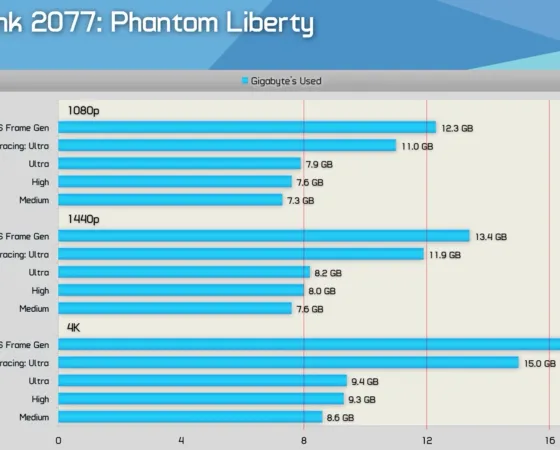'How Good Is ChatGPT at Coding, Really?'
Read more of this story at Slashdot.
Read more of this story at Slashdot.
Read more of this story at Slashdot.
Read more of this story at Slashdot.
Read more of this story at Slashdot.
Read more of this story at Slashdot.
Read more of this story at Slashdot.
Read more of this story at Slashdot.
Read more of this story at Slashdot.
Read more of this story at Slashdot.
 La quantité nécessaire de mémoire vive embarquée sur les cartes graphiques est un débat qui n'en finit plus et sur lequel il est difficile de statuer tant les données changent d'un jeu à l'autre. Du côté de NVIDIA, on fait clairement le pari pour le moment de la parcimonie. Au lancement de sa gamme...
La quantité nécessaire de mémoire vive embarquée sur les cartes graphiques est un débat qui n'en finit plus et sur lequel il est difficile de statuer tant les données changent d'un jeu à l'autre. Du côté de NVIDIA, on fait clairement le pari pour le moment de la parcimonie. Au lancement de sa gamme...
 L'une des nouveautés mises en avant par la marque ASRock lors du Computex 2024 qui se tenait début juin était l'annonce des ASRock Radeon WS Series. Au programme deux cartes, la ASRock Radeon RX 7900 XTX WS et la ASRock Radeon RX 7900 XT WS. Leur particularité : faire les yeux doux au monde de l'int...
L'une des nouveautés mises en avant par la marque ASRock lors du Computex 2024 qui se tenait début juin était l'annonce des ASRock Radeon WS Series. Au programme deux cartes, la ASRock Radeon RX 7900 XTX WS et la ASRock Radeon RX 7900 XT WS. Leur particularité : faire les yeux doux au monde de l'int...
 On vous rassure tout de suite, nous n'allons pas ici vous présenter une rumeur apocalyptique vous faisant croire qu'AMD aurait finalement laissé tomber l'architecture Zen 5 ou autre pour sa future et très attendue nouvelle gamme de Ryzen avec 3D V-Cache en AM5. Rien de toute cela et aucune nouvelle...
On vous rassure tout de suite, nous n'allons pas ici vous présenter une rumeur apocalyptique vous faisant croire qu'AMD aurait finalement laissé tomber l'architecture Zen 5 ou autre pour sa future et très attendue nouvelle gamme de Ryzen avec 3D V-Cache en AM5. Rien de toute cela et aucune nouvelle...
 Magnifique prix en solde chez LDLC sur un boîtier PC de la célèbre marque HYTE. Alors évidemment il faut commencer par le commencement et déjà la question se pose : ce HYTE Y40 rouge/noir est-il à votre goût ?Si la réponse est clairement "non", eh bien navré pour la petite perte de temps. Mais si vo...
Magnifique prix en solde chez LDLC sur un boîtier PC de la célèbre marque HYTE. Alors évidemment il faut commencer par le commencement et déjà la question se pose : ce HYTE Y40 rouge/noir est-il à votre goût ?Si la réponse est clairement "non", eh bien navré pour la petite perte de temps. Mais si vo...
 On se répète évidemment, mais pour rappel, si votre compte en banque pour vous monter un nouvelle configuration ne sourit pas trop, que vous avez un budget CPU de l'ordre de 100 à 150 € et visez un processeur aussi performant que possible en jeu et qui ne démérite pas pour autant en usage productif,...
On se répète évidemment, mais pour rappel, si votre compte en banque pour vous monter un nouvelle configuration ne sourit pas trop, que vous avez un budget CPU de l'ordre de 100 à 150 € et visez un processeur aussi performant que possible en jeu et qui ne démérite pas pour autant en usage productif,...
 Le souci des packs comme celui que nous vous proposons aujourd'hui en Bon plan est d'être concerné par l'offre. En effet, tout le monde n'est pas à la fois dans le besoin d'un kit de DDR4-3600 et, dans le même temps, d'un SSD SATA 2 To. Mais si par le plus grand des hasards cette situation est la vô...
Le souci des packs comme celui que nous vous proposons aujourd'hui en Bon plan est d'être concerné par l'offre. En effet, tout le monde n'est pas à la fois dans le besoin d'un kit de DDR4-3600 et, dans le même temps, d'un SSD SATA 2 To. Mais si par le plus grand des hasards cette situation est la vô...
 Non non, ce n'est pas une blague, un jeu de mot ou une quelconque métaphore. Le début de l'histoire remonte à la période de la pandémie du Covid-19. Le gouvernement japonais avait alors été pointé du doigt par son propre peuple pour ses difficultés à gérer la crise et notamment mettre en place des l...
Non non, ce n'est pas une blague, un jeu de mot ou une quelconque métaphore. Le début de l'histoire remonte à la période de la pandémie du Covid-19. Le gouvernement japonais avait alors été pointé du doigt par son propre peuple pour ses difficultés à gérer la crise et notamment mettre en place des l...
 10 caloducs sur un seul ventirad, il fallait oser tout de même ! C'est pourtant bel et bien ce que la société CRYORIG vient de mettre au point et non seulement sur un refroidisseur CPU à double tour, mais également sur une variante à une seule tour !Leurs petits noms : les CRYORIG OE10 et CRYORIG TE...
10 caloducs sur un seul ventirad, il fallait oser tout de même ! C'est pourtant bel et bien ce que la société CRYORIG vient de mettre au point et non seulement sur un refroidisseur CPU à double tour, mais également sur une variante à une seule tour !Leurs petits noms : les CRYORIG OE10 et CRYORIG TE...
 Voilà le genre d'histoire qui ne fait pas du bien à l'image d'une société et on imagine que ASRock, GIGABYTE et ZOTAC auront tous trois à cœur de rapidement satisfaire la demande qui leur a expressément été faite, afin de montrer leur bonne intention à faire avancer les choses dans le sens de leurs...
Voilà le genre d'histoire qui ne fait pas du bien à l'image d'une société et on imagine que ASRock, GIGABYTE et ZOTAC auront tous trois à cœur de rapidement satisfaire la demande qui leur a expressément été faite, afin de montrer leur bonne intention à faire avancer les choses dans le sens de leurs...
 Cette semaine, le mardi 2 juillet 2024 pour être précis, sortait The First Descendant, le nouveau FPS propulsé par l'Unreal Engine 5 de NEXON. Un jeu free-to-play qui plus est, donc de très nombreux joueurs étaient là pour tester le bestiau le jour J en se disant qu'ils n'avaient rien à perdre à l'e...
Cette semaine, le mardi 2 juillet 2024 pour être précis, sortait The First Descendant, le nouveau FPS propulsé par l'Unreal Engine 5 de NEXON. Un jeu free-to-play qui plus est, donc de très nombreux joueurs étaient là pour tester le bestiau le jour J en se disant qu'ils n'avaient rien à perdre à l'e...